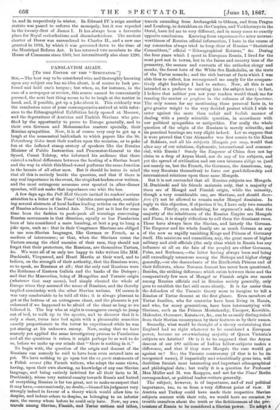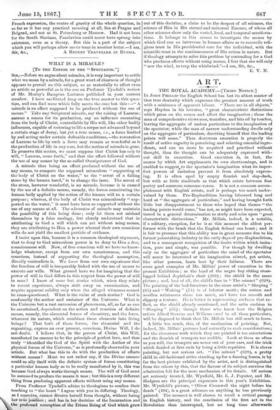PANSLAVISM AGAIN.
[To THE EDITOR OF THE " SPECTATOR."] Sin,—The best way to be considered wise and thoroughly knowing upon any subject one has no idea about, is of course to look pro- found and hold one's tongue ; but when, as, for instance, in the case of a newspaper or review, this course cannot be conveniently pursued, the next best thing seems to be to laugh at the matter in hand, and, if possible, get up a joke about it. This evidently was the conclusion some of your contemporaries arrived at with refer- ence to the Ethnographical Exhibition lately opened at Moscow, and the deputations of Austrian and Turkish Slavians who pro- fited by the opportunity to prove to Europe generally, and to their own German and Mohammedan masters specially, their Russian sympathies. Now, it is of course very easy to get up a laugh at the nonsensical balderdash to which papers like the St. Petersburg Golos treat their readers upon the occasion, or to poke fun at the inflated stump oratory of speakers like the Russian Minister of Public Instruction and Procurator-General to the Synod, Count Tolstoy, who informed his audience that there existed a radical difference between the beating of a Slavian heart and the way in which this blood-vessel performs the same function in the breasts of all other men. But it should be borne in mind that all this is entirely beside the question, and that if there is any real importance in the event, the stupidest leaders ever written, and the most outrageous nonsense ever spouted in after-dinner speeches, will not make that importance one whit the less.
A few days ago the Pall Mall Gazette invited its readers' serious attention to a letter of the Times' Calcutta correspondent, contain- ing several abstracts of local Indian leading articles on the subject of Russian advance in Central Asia. Now, just as it has for some time been the fashion to pooh-pooh all warnings concerning Russian movements in that direction, equally so has Panslavism been of late considered a mere humbug, at best a peg to hang a joke upon, such as : that in their Congresses Slavians are obliged to use non-Slavian languages, like German or French, as a medium of intercourse; or that, when the Slavians count the Tartars among the chief enemies of their race, they should not forget that their protectors, the Russians, are themselves Tartars, &c. We were all of us only too happy to take writers like MM. Duchinski, Vicquesuel, and Henri Martin at their word, and to believe, on the strength of their authority, that the Russians were, so to speak, no Russians at all ; that the only real Russians were the Ruthenes of Eastern Galicia and the banks of the Dnieper ; and that the Muscovites, being of Mongolian and Turanic origin (whatever that may mean), had simply cheated the whole of Europe when they assumed the name of Russians, and the thereby implied cousinship with the other Slavian nations. Of course it was very comfortable to be told all this ; it is always pleasant to get at the bottom of an outrageous cheat, and the pleasure is yet enhanced if we happened to be afraid of the cheat as long as we believed it. The boy who at night is courageous enough to jump out of bed, to walk up to the spectre, and to discover that it is only a sheet, turns into bed again with a pleasurable sensation exactly proportionate to the terror he experienced while he was yet staring at his unknown enemy. Now, seeing that we have scarcely yet applied the same investigatory process to Panslavism and all the questions it raises, it might perhaps be as well to do so, before we make up our minds that " there is nothing in it."
To begin with, the question of the origin and descent of the Russians can scarcely be said to have been even entered into as yet. We hav'e nothing to go upon but the ex parte statements of a Polish savant (the French writers, who adopt the same views, having, upon their own showing, no knowledge of any one Slavian language, and being entirely indebted for all their facts to M. Duchinski), whose very natural enmity towards Russia and hatred of everything Russian is far too great, not to make us suspect that it may have,—unconsciously, no doubt,—biassed his judgment very strongly indeed in favour of a theory which would allow him to despise, and induce others to despise, as belonging to an inferior race, the enemy whom before he could only hate. Now, my own travels among Slavian, Finnish, and Tartar nations and tribes, travels extending from Archangelsk to Odessa, and from Prague and Lemberg, to Astrakhan on the Caspian, and Verkhoturye in the Ooral, have led me to very different, and in many cases to exactly opposite conclusions. Knowing from experience the utter untrust- worthiness of Russian official information, I have in the course of my researches always tried to keep clear of Russian " Statistical Committees," official " Ethnographical Returns," &c. During the four years which I spent in European Russia, I lived for the most part not in towns, but in the farms and country inns of the peasantry, the manses and convents of the orthodox clergy and monks, the forest huts of the White Sea Raskolniks, or the tents of the Tartar nomads ; and the rich harvest of facts which I was able thus to collect, has recompensed me amply for the compara- tively slight hardships I had to endure. Now, all this is not intended as a preface to entering into the subject here ; in fact, I believe that neither you nor your readers would thank me for treating the matter ex professo in the columns of the Spectator: The only reason for my mentioning these personal facts iff to give greater weight to the very decided protest which I wish to enter against the more than unfair and foolish manner of dealing with a purely scientific question, in accordance with our political sympathies or antipathies. For really the whole question of the origin of the Russians is merely scientific, and its practical bearings are very slight indeed. Let us suppose that it were proved that Czar Alexander was first cousin to the Khan of Bokhara, and all his subjects Mongols per sang, would that alter any of our relations, diplomatic, international and commer- cial, with Russia? Surely the Emperor of China does not lay claim to a drop of Aryan blood, nor do any of his subjects, and yet the spread of civilization and our own interests oblige us (and not merely us, but the French, the Germans, the Ainericans, nay, the very Russians themselves) to force our good-fellowship and international relations upon these same Mongols.
But it is not contended that all Russian subjects are Mongols. M. Duchinski and his friends maintain only, that a majority of them are of Mongol and Finnish origin, while the minority, though a very considerable one, are Slavians, and should there- fore (?) not be allowed to remain under Mongol dominion. In reply to this objection, if objection it be, I have only two remarks to offer. Firstly, even admitting, for argument's sake, that the majority of the inhabitants of the Russian Empire are Mongols and Finns, it is simply ridiculous to call them the dominant races. These have always been the Slavian, and latterly the German. The Emperor and his whole family are as much German as any of the now so rapidly vanishing Kings and Princes of Germany itself. His ministers and councillors, nay, the great mass of higher military and civil officials (the only class which in Russia has any
influence at all on the fate of the people) are either Germans, Poles, and Ruthenes,—the latter having always been and being
still exceedingly numerous among the Bishops and higher clergy generally,—or else descendants of the Rurikovich Princes and of their followers, whose Norman descent has never been questioned.. Besides, the striking difference which exists between these and the comparatively few men of Mongol or Finnish origin one meets among Russian officials and in Russian society generally, only goes to establish the fact still more clearly. It is far easier than the defenders of the Turanic theory seem to imagine to tell a Russian of Tartar descent at the first glance. Even members of.
Tartar families, who for centuries have been living in Russia, and who, for many generations, have been intermarrying with Slavians, such as the Princes Meshcliersky, Usoopov, Koorhkin, Makoolov, Ooroosov, Karata-ev, &c., can be as easily distinguished from their Slavia.n countrymen by their features as by their names. Secondly, what would be thought of a theory maintaining that England had no right whatever to be considered a European power, because an overwhelming majority of Queen Victoria's subjects are Asiatics? Or is it to be supposed that the Aryan descent of our 180 millions of Indian fellow-subjects makes a
difference, and that if they were Mongols the case would go against us ? No; the Turanic controversy (if that is to be its recognized name), if impartially and scientifically gone into, will doubtless furnish most interesting and important ethnographical and philological data ; but really it is a question for Professor " Max Muller and M. von Koeppen, and not for the Times' Berlin correspondent, or political leader-writers generally.
The subject, however, is of importance, and of real political importance, too, to us from a very different point of view. If
Austria and Turkey could have made their respective Slavian subjects content with their rule, we would have no occasion to trouble ourselves about the truth or the fictitiousness of the pre- tensions of Russia to be-considered a Slavian power. To adopt a
French expression, the centre of gravity of the whole question, in so far as it has any practical meaning at all, lies at Prague and Belgrad, and not at St. Petersburg or Moscow. Had it not been for the South Slavians, Panslavism could never have sprung into existence, even as a theory. But this is a part of the subject which you will perhaps allow me to treat in another letter.—I am, Sir, &c., A RECENT TRAVELLER IN RUSSIA.































 Previous page
Previous page